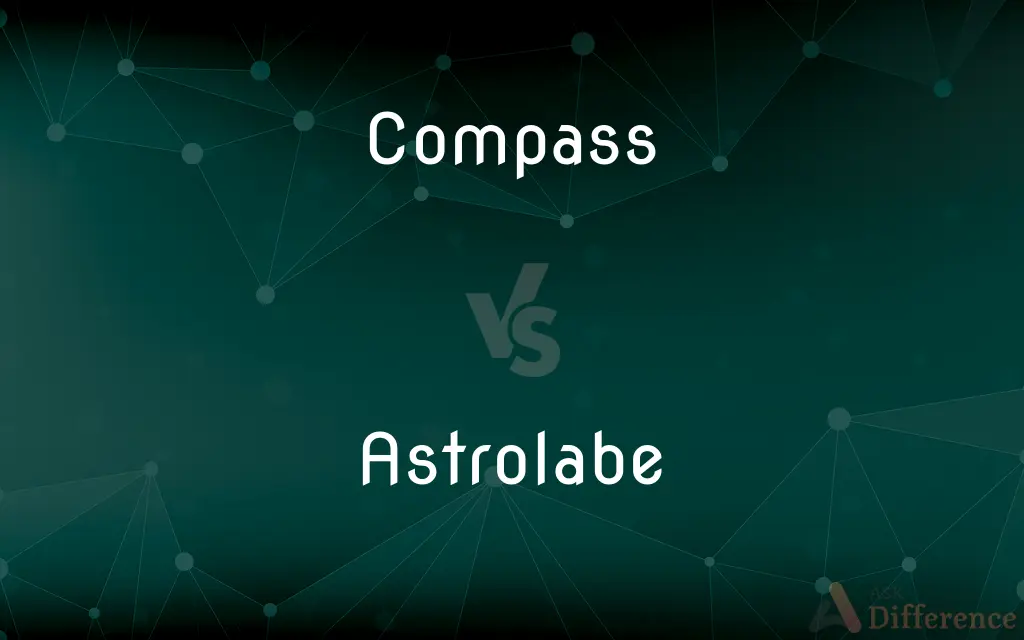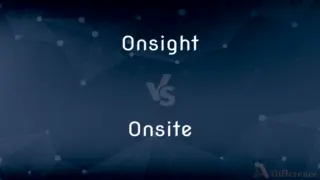Compass vs. Astrolabe — What's the Difference?
By Maham Liaqat & Urooj Arif — Updated on April 2, 2024
A compass is a navigational instrument for determining direction, while an astrolabe is an ancient tool used for solving problems related to time and the position of the stars and planets.

Difference Between Compass and Astrolabe
Table of Contents
ADVERTISEMENT
Key Differences
The compass, consisting primarily of a magnetized needle that aligns itself with Earth's magnetic field, points towards magnetic north, providing essential orientation for navigation. It has been a cornerstone in maritime and land exploration, facilitating travel and geographic discovery. In contrast, the astrolabe, a complex instrument that combines a model of the sky's rotation with a simple rule-based computing device, allows users to measure the altitude of celestial bodies. This measurement can then be used to solve various astronomical and navigational problems, such as determining local time, latitude, and even predicting the positions of the Sun, Moon, stars, and planets.
While the compass is used primarily for direction finding, the astrolabe's functions are more diverse, serving not only for navigation but also for astronomical observations. Its capability to provide solutions for how the sky looks at a specific place at a given time makes it invaluable for early astronomers and navigators.
The invention of the magnetic compass significantly impacted navigation by providing a simple and direct method for determining direction, which is less dependent on the observation of celestial bodies. This advancement made navigation more reliable, especially under conditions where the stars or sun were obscured. On the other hand, the astrolabe, despite being less crucial for direction finding, remained an important tool for understanding and teaching the principles of astronomy and navigation until it was eventually supplanted by more modern instruments like the sextant.
The operational complexity of the astrolabe, requiring knowledge of celestial movements and spherical astronomy, contrasts with the compass's straightforward use. The compass's ease of use and direct application to navigation has ensured its continued relevance and ubiquity in modern times. Meanwhile, the astrolabe, with its intricate design and multifaceted applications, stands as a testament to the sophistication of ancient and medieval science and technology.
Technological evolution has seen the compass integrate into various modern devices, including smartphones and GPS systems, enhancing its accessibility and functionality. Conversely, the astrolabe, while no longer used practically, remains a subject of historical and scientific interest, reflecting the ingenuity of its creators and its role in the advancement of navigation and astronomy.
ADVERTISEMENT
Comparison Chart
Primary Function
Determines direction relative to Earth's magnetic poles.
Measures the altitude of celestial bodies for astronomical and navigational calculations.
Use in Navigation
Essential for indicating direction.
Used to solve problems related to time, latitude, and celestial positions.
Operational Complexity
Simple to use; requires minimal knowledge to operate.
Complex; requires understanding of celestial movements and spherical astronomy.
Historical Impact
Revolutionized navigation by providing a reliable means to determine direction.
Played a crucial role in the development of astronomy and navigation techniques.
Technological Evolution
Integrated into modern electronic devices for enhanced functionality.
Served as a foundational tool in astronomy, largely replaced by more modern instruments.
Compare with Definitions
Compass
Integrated into modern technology.
Modern smartphones include a digital compass for orientation.
Astrolabe
Complex and multifunctional.
Astrolabes could calculate time, determine latitude, and assist in celestial navigation.
Compass
A device for finding direction.
Sailors rely on the compass for navigation at sea.
Astrolabe
Requires specialized knowledge.
Operating an astrolabe demands a good understanding of astronomy and mathematics.
Compass
Simple and direct in use.
With a compass, determining the north direction is straightforward.
Astrolabe
Ancient astronomical instrument.
The astrolabe was used by astronomers to track celestial bodies.
Compass
Vital for explorers and travelers.
The compass was indispensable for early explorers charting new territories.
Astrolabe
Instrument for education and exploration.
Historically, astrolabes were essential in teaching the principles of astronomy.
Compass
Continues to be widely used.
The compass remains a basic tool in outdoor activities like hiking and orienteering.
Astrolabe
A testament to historical ingenuity.
The astrolabe illustrates the advanced scientific knowledge of its time.
Compass
A compass is a device that shows the cardinal directions used for navigation and geographic orientation. It commonly consists of a magnetized needle or other element, such as a compass card or compass rose, which can pivot to align itself with magnetic north.
Astrolabe
An astrolabe (Ancient Greek: ἀστρολάβος astrolabos; Arabic: ٱلأَسْطُرلاب al-Asturlāb; Persian: ستارهیاب Setāreyāb) is an ancient astronomical instrument that was a handheld model of the universe. Its various functions also make it an elaborate inclinometer and an analogue calculation device capable of working out several kinds of problems in astronomy.
Compass
An instrument containing a magnetized pointer which shows the direction of magnetic north and bearings from it
Walkers should be equipped with a map and compass
A magnetic compass
Crewe was ideally placed on the rail network, with connections running to all points of the compass
Astrolabe
An astronomical and navigational instrument for gauging the altitude of the Sun and stars.
Compass
An instrument for drawing circles and arcs and measuring distances between points, consisting of two arms linked by a movable joint, one arm ending in a point and the other usually carrying a pencil or pen
A regular heptagon cannot be constructed accurately with only ruler and compass
Astrolabe
An instrument for observing or showing the positions of the stars. It is now disused.
Compass
The range or scope of something
The event had political repercussions which are beyond the compass of this book
Goods and services which fall within the compass of the free market
Astrolabe
A stereographic projection of the sphere on the plane of a great circle, as the equator, or a meridian; a planisphere.
Compass
Go round (something) in a circular course
The ship wherein Magellan compassed the world
Compass
Contrive to accomplish (something)
He compassed his end only by the exercise of violence
Compass
A device used to determine geographic direction, usually consisting of a magnetic needle or needles horizontally mounted or suspended and free to pivot until aligned with the earth's magnetic field.
Compass
Another device, such as a radio compass or a gyrocompass, used for determining geographic direction.
Compass
A V-shaped device for describing circles or circular arcs and for taking measurements, consisting of a pair of rigid, end-hinged legs, one of which is equipped with a pen, pencil, or other marker and the other with a sharp point providing a pivot about which the drawing leg is turned. Also called pair of compasses.
Compass
Awareness or understanding of one's purpose or objectives
"Lacking a coherent intellectual and moral commitment, [he] was forced to find his compass in personal experience" (Doris Kearns Goodwin).
Compass
An enclosing line or boundary; a circumference
Outside the compass of the fence.
Compass
A restricted space or area
Four huge crates within the compass of the elevator.
Compass
Range or scope, as of understanding, perception, or authority
The subject falls outside the compass of this study.
Compass
(Music) See range.
Compass
To make a circuit of; circle
The sailboat compassed the island.
Compass
To surround; encircle
The trees compass the grave.
Compass
To understand; comprehend
"God ... is too great a profundity to be compassed by human cerebration" (Flann O'Brian).
Compass
To accomplish or bring about
"He compassed his end only by the exercise of gentle violence" (Henry James).
Compass
To gain or achieve
"She had compassed the high felicity of seeing the two men beautifully take to each another" (Henry James).
Compass
Forming a curve.
Compass
A magnetic or electronic device used to determine the cardinal directions (usually magnetic or true north).
Compass
A pair of compasses (a device used to draw an arc or circle).
Compass
(music) The range of notes of a musical instrument or voice.
Compass
(obsolete) A space within limits; an area.
Compass
(obsolete) An enclosing limit; a boundary, a circumference.
Within the compass of an encircling wall
Compass
Moderate bounds, limits of truth; moderation; due limits; used with within.
Compass
(archaic) Scope.
Compass
(obsolete) Range, reach.
Compass
(obsolete) A passing round; circuit; circuitous course.
Compass
To surround; to encircle; to environ; to stretch round.
Compass
To go about or round entirely; to traverse.
Compass
(dated) To accomplish; to reach; to achieve; to obtain.
Compass
(dated) To plot; to scheme (against someone).
Compass
(obsolete) In a circuit; round about.
Compass
A passing round; circuit; circuitous course.
They fetched a compass of seven day's journey.
This day I breathed first; time is come round,And where I did begin, there shall I end;My life is run his compass.
Compass
An inclosing limit; boundary; circumference; as, within the compass of an encircling wall.
Compass
An inclosed space; an area; extent.
Their wisdom . . . lies in a very narrow compass.
Compass
Extent; reach; sweep; capacity; sphere; as, the compass of his eye; the compass of imagination.
The compass of his argument.
Compass
Moderate bounds, limits of truth; moderation; due limits; - used with within.
In two hundred years before (I speak within compass), no such commission had been executed.
Compass
The range of notes, or tones, within the capacity of a voice or instrument.
You would sound me from my lowest note to the top of my compass.
Compass
An instrument for determining directions upon the earth's surface by means of a magnetized bar or needle turning freely upon a pivot and pointing in a northerly and southerly direction.
He that first discovered the use of the compass did more for the supplying and increase of useful commodities than those who built workhouses.
Compass
A pair of compasses.
To fix one foot of their compass wherever they please.
Compass
A circle; a continent.
The tryne compas [the threefold world containing earth, sea, and heaven. Skeat.]
Its leaves are turned to the north as true as the magnet:This is the compass flower.
Compass
To go about or entirely round; to make the circuit of.
Ye shall compass the city seven times.
We the globe can compass soon.
Compass
To inclose on all sides; to surround; to encircle; to environ; to invest; to besiege; - used with about, round, around, and round about.
With terrors and with clamors compassed round.
Now all the blessingsOf a glad father compass thee about.
Thine enemies shall cast a trench about thee, and compass thee round.
Compass
To reach round; to circumvent; to get within one's power; to obtain; to accomplish.
If I can check my erring love, I will:If not, to compass her I'll use my skill.
How can you hope to compass your designs?
Compass
To curve; to bend into a circular form.
Compass
Navigational instrument for finding directions
Compass
An area in which something acts or operates or has power or control:
The range of a supersonic jet
The ambit of municipal legislation
Within the compass of this article
Within the scope of an investigation
Outside the reach of the law
In the political orbit of a world power
Compass
The limit of capability;
Within the compass of education
Compass
Drafting instrument used for drawing circles
Compass
Bring about; accomplish;
This writer attempts more than his talents can compass
Compass
Travel around, either by plane or ship;
We compassed the earth
Compass
Get the meaning of something;
Do you comprehend the meaning of this letter?
Common Curiosities
What is a compass used for?
A compass is used for finding direction, particularly magnetic north, aiding in navigation and orientation.
How did the invention of the compass impact exploration?
The invention of the compass made sea travel more reliable by providing a consistent means to determine direction, significantly aiding global exploration.
How does an astrolabe work?
An astrolabe measures the altitude of celestial bodies above the horizon, allowing for calculations related to time, latitude, and celestial positions.
Can a compass determine location?
A compass alone cannot determine location; it only indicates direction. Determining precise location requires additional instruments or methods.
Can an astrolabe be used during the day?
Yes, an astrolabe can be used during the day by measuring the Sun's altitude or by using the shadow cast by its pointer, though it is traditionally associated with nighttime celestial observations.
How has digital technology enhanced traditional compass functionality?
Digital technology has enhanced traditional compass functionality by integrating it with GPS, maps, and other sensors in devices like smartphones and smartwatches, providing users with real-time orientation, navigation, and location data.
Can modern technology replace the compass?
While modern GPS devices provide comprehensive navigational functions, the compass remains a simple, reliable tool for direction finding, especially where electronic devices might fail.
Is it possible to use a compass in polar regions?
While a compass can be used in polar regions, its accuracy decreases near the magnetic poles due to the Earth's magnetic field lines converging vertically, potentially causing the needle to tilt or become erratic.
What makes the astrolabe significant in the history of science?
The astrolabe's complexity and versatility highlight the advanced understanding of astronomy and mathematics in ancient and medieval cultures, contributing significantly to these fields' development.
What historical civilizations contributed to the development of the astrolabe?
The development of the astrolabe was influenced by various civilizations, including the Greeks, who invented it, and later the Islamic scholars, who made significant advancements, followed by European astronomers who further refined it.
How does a magnetic compass differ from a gyrocompass?
A magnetic compass aligns with Earth's magnetic field to indicate magnetic north, while a gyrocompass uses Earth's rotation to find true north, unaffected by magnetic variations.
Share Your Discovery

Previous Comparison
Taxies vs. Taxis
Next Comparison
Onsight vs. OnsiteAuthor Spotlight
Written by
Maham LiaqatCo-written by
Urooj ArifUrooj is a skilled content writer at Ask Difference, known for her exceptional ability to simplify complex topics into engaging and informative content. With a passion for research and a flair for clear, concise writing, she consistently delivers articles that resonate with our diverse audience.
















































